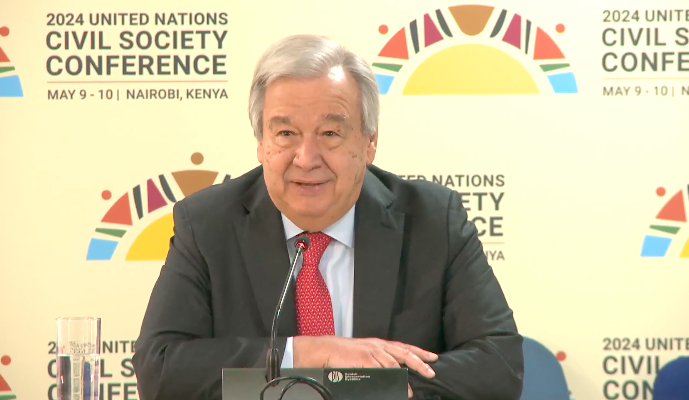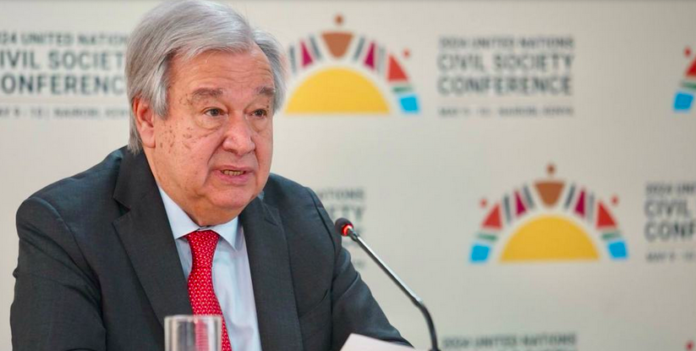By Winnie Kamau
Nairobi, Kenya: The world watched with bated breath as the United Nations Secretary-General, Antonio Guterres, addressed the media with a solemn expression. Speaking at the sidelines of the UN Civil Society Conference held in Kenya’s capital, Nairobi, his words carried the weight of the immense suffering unfolding across the globe, as conflicts raged and humanitarian crises loomed.
In the Middle East, the fate of Palestinians and Israelis hung precariously in the balance. Guterres implored the Israeli government and the leadership of Hamas to demonstrate political courage, spare no effort to reach an agreement and stop the bloodshed that had claimed countless lives.
“The fate of Palestinians, Israelis, and the entire region hangs in the balance. I reiterate my appeal for the Government of Israel and the leadership of Hamas to demonstrate political courage and spare no effort to reach agreement to stop the bloodshed – and to free the hostages” urged Antonio Guterres.
The situation in Rafah was particularly dire, with airstrikes continuing relentlessly, forcing over a million Palestinians, half of them children, to seek shelter in the Rafah Governorate.
“The situation in Rafah is on a knife’s edge, as airstrikes continue throughout southern Gaza. Over one million Palestinians, half of whom are children, have crowded into the Rafah Governorate for shelter. We are actively engaging with all involved for the resumption of the entry of life-saving supplies – including desperately needed fuel – through the Rafah and Kerem Shalom crossings” the UN Chief pleaded.
 Guterres painted a grim picture of the situation in Gaza, where the key medical facilities in Rafah could soon become inaccessible or inoperable, including the only dialysis department still operating. “A massive ground attack in Rafah would lead to an epic humanitarian disaster and pull the plug on our efforts to support people as famine looms,” he warned, his voice laced with urgency.
Guterres painted a grim picture of the situation in Gaza, where the key medical facilities in Rafah could soon become inaccessible or inoperable, including the only dialysis department still operating. “A massive ground attack in Rafah would lead to an epic humanitarian disaster and pull the plug on our efforts to support people as famine looms,” he warned, his voice laced with urgency.
Adding “Meanwhile, our health partners tell us that all the key medical facilities in Rafah could soon become inaccessible or inoperable – including the only dialysis department still operating in Gaza. Around 100,000 Palestinians are moving north from Rafah, yet humanitarian partners have no tents or food stores left in south Gaza” the Chief elaborated.
Turning his attention to the African continent, Guterres highlighted the conflicts that were tearing lives and communities apart. He commended the African Union’s efforts to silence the guns and pledged the United Nations’ full support and cooperation in mobilizing the international community for peace, from the Sahel to the Horn of Africa, the Great Lakes, and beyond.
“I am particularly concerned about the ongoing war in Sudan where we are witnessing indiscriminate attacks against civilians, grotesque sexual violence against women and girls, and humanitarians blocked, attacked, and killed. Close to nine million people have fled their homes. The World Food Programme warns that the window of time to prevent starvation in Darfur is closing rapidly. Violent clashes in El Fasher are preventing aid from getting through” Antonio explained with a lot of concern.
The ongoing war in Sudan was a particular source of concern, with indiscriminate attacks against civilians, grotesque sexual violence against women and girls, and humanitarian workers being blocked, attacked, and killed. Guterres painted a harrowing picture of nearly nine million people fleeing their homes, and the World Food Programme warning of the rapidly closing window of time to prevent starvation in Darfur.
“An attack on the city would have devastating consequences for civilians. And would likely see the conflict tear across Darfur. I am also very concerned by reports of escalating violence in North and South Kordofan and Al Jazirah States. I call on all parties to abide by international humanitarian law, protect civilians, and facilitate full and unrestricted humanitarian access. Ultimately, we know that there is no military solution to this conflict” Guterres’s words carried a sense of urgency.
A call for action to the international community to speak with one voice for an immediate humanitarian ceasefire, the unconditional release of all hostages, and a massive surge in life-saving aid. He emphasized the need for an urgent, coordinated international effort to deliver a political process that could get Sudan back on track, spearheaded by the region and owned by the Sudanese people.
“We need an urgent, coordinated international effort to deliver a political process that can get Sudan back on track. I welcome the steps taken to end the conflict including efforts by the Intergovernmental Authority on Development -IGAD-, the African Union, the League of Arab States, and through the Jeddah process” the Chief urged.
As the Secretary-General’s speech drew to a close, his message resounded clearly: the crises the world faced demanded international solutions, saying the United Nations would never stop fighting to deliver – for Africa and for all of humanity.














